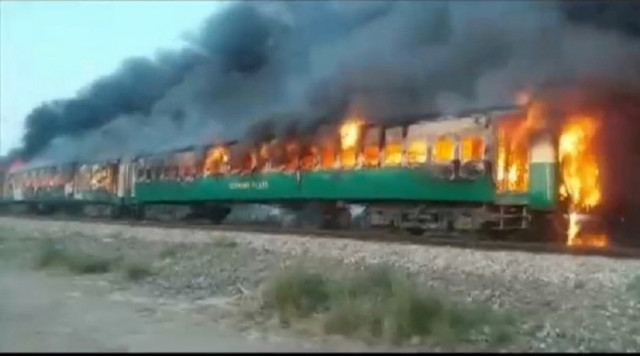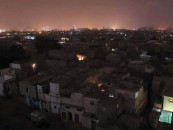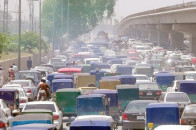Trains chug along, ignoring firefighting upgrades
Outdated equipment and untrained staff increase the risk of fatal fire incidents

In the developed world, where all passengers are strictly bound by stringent laws, trains are still fully equipped with the latest safety paraphernalia, in order to prevent the scale of damage in the event of a deadly emergency. Yet, when it comes to Pakistan, where deviant passengers continue to illegally carry gas cylinders through their luggage, the railway authorities have failed to upgrade the paraphernalia and personnel employed for dealing with a fire outbreak.
The Pakistan Railway's Fire Brigade Department, which is tasked with preventing and managing fire breakouts on trains, is suffering due to neglect and a lack of upgradation and maintenance. Compounding this issue, the department's personnel lack training in modern fire safety protocols, rendering them ill-equipped to handle emergencies. In essence, the fire safety departments across major stations of the country, are now incapable of dealing with a fire emergency, posing a significant threat to the lives of passengers regularly travelling through the trains, which are an affordable mode of intercity travel.
"Pakistan Railways' fire-fighting system was better in the past, with several fire tenders and trained staff. However, now the system has deteriorated over time and needs to be improved. Furthermore, the staff must also be trained to meet modern requirements," affirmed Saeed Jadoon, fire-fighting expert and former Chief Fire Officer at the Karachi Port Trust.
Jadoon's observation was confirmed by a survey conducted by The Express Tribune in Karachi, where only one fire station and one fire tender were available at the Cantonment Station of the Karachi Division, which comprises of 81 stations, spanning from Karachi to Tando Adam, Kotri, Dadu, Hyderabad, Mirpur Khas, and Khokhrapar. Furthermore, there was a severe shortage of fire extinguishers in the train carriages while the existing ones were either outdated or non-functional. Other essential equipment like buckets, foam, and more were also lacking while the staff were not adequately trained to handle fire emergencies.
Deputy Superintendent Operations Karachi Division, Nasir Nazeer, stated that the fire station at City Station was closed and relocated to Cantonment Station due to the dilapidated condition of the building. "However, 800 fire extinguishers are installed in the Karachi Division, where every carriage has basic fire-fighting equipment and the staff is also trained," claimed Nazeer.
In contrast, Karachi Municipal Corporation (KMC)'s Fire Brigade officials reported that Pakistan Railways rarely responded to fire incidents using its own resources, and KMC fire tenders and staff were usually the ones to extinguish fires at railway facilities within Karachi's limits.
The situation was quite similar at the Lahore Railway Station, alongside other small and large railway stations across Punjab, which too severely lacked modern fire-fighting equipment like fire extinguishers, which were either unused or expired and hence incapable of controlling a fire breakout caused by a gas leak or short circuit.
"Although some fire extinguishers are placed in different trains and are available with the train driver, guard, air conditioner supervisor, and charging plant supervisor, they are only effective for small-scale fires and prove useless in case of larger breakouts. The extinguishers are small, similar to those used in cars. Therefore, there is a serious need for the upgradation of railway facilities in such a way that all carriages are equipped with the latest fire-fighting equipment and extinguishers. Furthermore, liquid-based extinguishers should be replaced with foam-based ones, which are more effective in combating fires," analysed Raja Muhammad Pervez, a retired senior railway officer at the Lahore Station.
Miles up north in Peshawar, Zawar Khan, an officer at the Peshawar Cantt Railway Station regrettably told The Express Tribune that although the station had a firefighting vehicle and its accompanying staff, the vehicle had been standing for years and could never be used to extinguish a fire," claimed Khan.
"Hence, it would be much better if a rail fire-fighter vehicle could be launched, which could reach the incident quickly by running on the track. This way the scale of damage could be reduced, and lives could be saved," seconded Farooq Khan, another employee at the Peshawar Railway Station.
Since its inception, Pakistan Railways has been notorious for the frequency of its fatal collisions and fire incidents, with nearly 1,340 innocent lives lost and several more injured in countless train accidents during the past seven decades, making Pakistan rank sixth or seventh globally in the list of most unsafe railways.
Such revelations are surprising, considering the fact that the railway tracks inherited from the British have not been upgraded at all, with some exceeding a lifetime of over 100 years.
According to Tariq Moin, Director Training of the Fire Protection Association Pakistan, the carriages of Pakistan Railways must be equipped with two fire extinguishers, fire alarm buttons, emergency braking buttons or levers, emergency escape windows, hammers for breaking windows in emergencies, improved electrical wiring, and fire-resistant stoves in kitchens.
"Furthermore, the cranes deployed during accidents should be equipped with fire-fighting equipment while regular fire drills should be organized for the staff. Installation of smoke detectors and fire alarms, proper maintenance of electrical systems and implementation of fire safety protocols in kitchens and dining areas, alongside conducting regular fire safety inspections are also key measures for preventing fire emergencies," suggested Moin.
"Our train staff had received firefighting training some time ago. Since the current seats' fabric catches fire quickly, new seats will be made from materials that are resistant to ignition. Furthermore, measures are being taken to control short circuits while faulty wiring in carriages is also being replaced," asserted the spokesperson for Pakistan Railways, Babar Raza.



















COMMENTS
Comments are moderated and generally will be posted if they are on-topic and not abusive.
For more information, please see our Comments FAQ